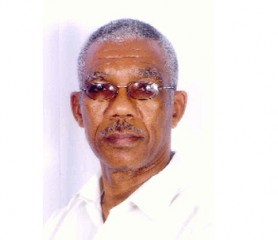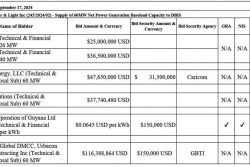Uniting the fractured People’s National Congress Reform (PNCR) will be at the top of retired Brigadier David Granger’s list should he be nominated as the party’s presidential candidate for next year’s elections.
Granger last evening confirmed a Capitol News report that he has accepted the nomination by a group of party members and has allowed his name to be taken before the party’s Selection Committee. The nine-member committee, which is chaired by the party’s General-Secretary Oscar Clarke, has to submit the list of persons nominated to the Central Executive Committee and party members will then get the opportunity to vote for their candidate at the next general council.

“It was during the month of September I was approached and I was a member of the Selection Committee and when I decided to accept I had to resign (from the committee),” Granger told Stabroek News last evening. However, he stressed that the process is still ongoing pointing out that the fact that he has been nominated does not mean that he would be the party’s presidential candidate but added that it “is a very transparent process.” Regardless of who is nominated as the presidential candidate, Robert Corbin will remain its leader.
According to Granger his backers indicated that they were looking for a candidate that can “bring the party together.”
“I will be looking to unite the party… Mr Corbin is going to remain leader and it is not going to be a one person show. A team would be put together…” the former national security advisor to the Desmond Hoyte administration told this newspaper. He said he has been asked by a “significant part of the party’s membership” to accept the nomination as they feel no other “candidate can unite the party.”
“They feel that I can bring the factions together,” Granger said.
In recent years there has been bitter infighting in the PNCR with some members publicly criticizing the operation of the party. When Corbin was re-elected as leader last year, beating out the party’s former chairman Winston Murray, there were some allegations of rigging. Following last year’s Biennial Congress, Richard Van West-Charles charged that the electoral process was “fraudulent,” from membership registration to voting. He contended that the party was “hijacked through an illegal process by personal agendas” once again and he submitted a report of irregularities that affected the results. “The results of the elections at the 16th Biennial Congress [are] not a reflection of the will of the party’s membership nor [are they] reflective of the will of the delegates who turned up,” the report concludes, adding “If irregularities did not exist Mr Winston Murray could have been elected leader.” There were accusations of rigging too when Volda Lawrence was elected as chairman of the Georgetown branch of the party over Aubrey Norton.
Corbin has been pressured to quit as party leader and presidential candidate as many in the PNCR view him as unelectable. Under his leadership the party has suffered serious reversals in the last two elections.
Granger said he is not afraid or ashamed to be associated with the PNCR since the party has sound internal procedures that were established over 50 years ago. He also said that the party represents a significant section of the population and this cannot be ignored. “The party has a strong internal institution. Yes, there has been division but I want unity and I want to play a part in that process,” he told Stabroek News.
Maintaining that the party would have the final say on who is nominated, Granger said he has not thought about who he would like to be on his ticket should he be selected.
“I have not begun to lobby anyone to support my ticket,” he stated when asked.
‘Not a politician’
Granger, who has had an illustrious career in the Guyana Defence Force and is widely considered a security expert, last evening admitted that he is not a politician but a professional. However, he said the situation of the country requires him to combine the two and work towards making Guyana a better and safer place. He said while in the past he has been asked to take up political office but has never accepted, he feels that the time is right since he has been a member of the party since he retired from the army some sixteen years ago.
Should the party put him forward as its presidential candidate and should he win the elections, at the top of Granger’s list of priorities will be crime and security.
“Security is the most pressing issue, people need a safe environment to operate in and the general quality of life needs to be improved,” the nominee said.
Granger said the fact that the national election is just about ten months away the time is right for him to announce his run for the candidacy. He said that he is looking forward to the future and how he can contribute to making Guyana a better place with quality education and a better standard of living. He said the country’s citizens do not need another five or ten years of what they have experienced in the last few years.
“If at the end of the day Guyana is a better place then it would be worth it,” Granger said. He noted that in years gone by massacres was not a word well known but now all can relate to it because of recent events. In the last three years there have been three massacres resulting in the deaths of many Guyanese. Massacres have occurred in Lusignan, Bartica, at Lindo Creek and just recently at Cummings Lodge.
Granger’s selection as the party’s candidate will not be an easy road as former government minister and PNCR Chairman Winston Murray has significant support in and out of the party to lead it into the elections. Many have pushed his name as the person who can give the party a chance in next year’s elections and while Murray has been a face associated with the party for many years, Granger can be described as a virtual unknown when it comes to PNCR business. He did however participate in a recent retreat that it held.
The quest by the PNCR for a presidential candidate comes weeks after the Alliance For Change declared that it would not consider an alliance with either the PNCR or the PPP/C.
Granger has spoken out on many national issues in the past.
In January this year, in an interview with Stabroek News, Granger who was one of the members of the Disciplined Forces Commission (DFC), said he strongly feels that there needs to be an independent commission of enquiry into the criminal upsurge in Guyana in recent years.
The aim of such an enquiry, which he said should be done by locals as the country does have independent and competent persons, would be to reform the Guyana Police Force, a process long overdue. Granger feels that without a major reform of the police force, which is 170 years old but has not kept up with the changes in criminal activities, the country would be unable to effectively fight crime.
He had also questioned why the more than 100 recommendations made by the DFC were not implemented and also why recommendations from the Symonds’ Report, which was done with the assistance of the British Government some years ago, are yet be put into practice.
To get a better understanding of what happened on the East Coast Demerara, the former army head called for a commission of enquiry. “The whole criminal episode needs to be investigated, people need to be called, evidence needs to be taken, analysis needs to be done to prevent a recurrence and you see we can learn, we can learn from a proper commission of enquiry. It is not a matter of embarrassing one group or another, it is a matter of preventing recurrence,” he had told Stabroek News.
He said there were several dimensions playing out on the East Coast and also mentioned the murders of former agriculture minister Satyadeow Sawh, his siblings and security guard; killings for which no answers have been provided and most of those who may have provided answers have been killed. “What is needed is a commission of enquiry to examine all of those deaths, all of those incidents all over again. It could be similar to the Disciplinary Forces Commission,” he suggested. “It has to be an independent judicial enquiry. I don’t think that the type of activity by the joint opposition parties is sufficient, that in itself is an attempt to prod the government to have a formal enquiry.”
The joint opposition parties last year published a dossier on human rights abuses here which they say placed a spotlight on the deteriorating security situation in Guyana. The parties had said that the dossier is intended to establish that there is a prima facie basis to warrant further interrogation of grave human rights abuses by an independent body with the requisite legal authority. And while the opposition parties have called for an international enquiry to be conducted, Granger said he believes that the enquiry should be done by locals. “I think we have the competence to have a local enquiry, in fact having served on the DFC, I would say yes that we do have the competence. [But we must] have independent people, we have all witnessed the death and destruction of that episode and to have people who are independent is what is desired.
“I think it would be good for the country as a whole if a careful and independent enquiry were conducted over that whole period of the troubles, even before 2002 going back all the way to Blackie London in 2000 [who was killed during a police and army operation in Eccles], because that was when we started to see violent crime and maybe a more violent response from the police and obviously things were just spinning out of control,” he said. Speaking on the criminal upsurge on the East Coast, Granger said that it also should be considered that it was not just the security forces on one side and the criminals on the other side but there was also the involvement of drug traffickers. He mentioned convicted drug trafficker Roger Khan’s public statement that he had had a hand in crime fighting. “As time went on it became more complicated… I think we have seen the damage that narco-trafficking has done to other countries like Colombia, Mexico and Guatemala, and I think once narco-traffickers are involved there is going to be extreme violence; there is going to be corruption; there is going be graft; policemen are going to be employed on the side of the drug traffickers and the conflict is likely to get worse rather than better.”
Going back to the DFC, Granger disclosed that all of the persons who went before the commission when asked what the biggest threat to national security was, said drugs. “… Drugs bring guns; drugs corrupt law enforcement officers and officials. There is money laundering. There is everything… it is not a victimless crime,” he said.
Police reform
“I think the question of criminal violence and the response to criminal violence is at the centre of police reform. I don’t think police reform should take place in a vacuum. We have had an extreme situation and I think that should guide us to the direction police reform should take.”
The country’s objective should be to make its citizens safe Granger had posited, adding that if there is a threat of violent crime the police force must be equipped, trained and deployed to cope with the violence. He said citizens want to be safe, even those living in troubled villages as no one wants to live on the edge and be anxious and have the fear of being killed like Donna Herod, who was caught in the crossfire while escorting her child from nursery school in Buxton. He said depending on the analysis derived from the commission of enquiry, the GDF could also be trained to give appropriate support to the police.
“I think an independent commission of enquiry would eliminate some of the guesswork and would put police reform back on the correct track. Right now it seems to have stalled. Acceptance of the DFC report, reintroduction of the security sector reform action plan, all these things seemed to have stalled.” Granger pointed out that after the massacres at Lusignan and Bartica, it was expected that there would have been an institutionalisation of civil society involvement in national security but this seems to have stalled. He said Guyana would be a safer country if the recommendations were implemented as the core of the matter is the need for the holistic reform of the police force. “The whole police force has to be looked at all over again….” he stressed.
Importantly, Granger said, the police force is 170 years old and at the start of the troubles on the East Coast in 2002 it was clear that despite its years in law enforcement the force was not prepared for the surge in violence. “That should have indicated, even at that time, that the police force was in need of reform because what started off as… violent criminal episodes ought to have been suppressed by the police force. But the defence force had to be called in to quell the troubles on the East Coast,” Granger said.
In November 2007, Granger had told Stabroek News that narcotics and fuel smuggling are corrupting Guyana on a large scale and he called on the security forces to spend time suppressing these rather than pursuing street criminals who are mere products of the more lucrative illegal trades.
Granger’s approach contrasted with that of President Bharrat Jagdeo who had called on the security forces to root out the small-scale drug pushers and criminals.
The former army officer said that at present the security forces’ crime intelligence was not sufficiently strong to perform those tasks. “The whole idea of intelligence is that you should not only be able to know about a crime, but also to anticipate and forestall the actions of criminals,” Granger declared. He added that the police force had suffered in this area over the years because of the behaviour of certain elements in the organization whose conduct had been dishonourable. “They have lost the confidence of some sections of the population, who could provide information which could be used as intelligence… their behaviour has been damaging and as a result of that, people who are aware of crimes and the behaviour of criminals are reluctant to tell the police,” Granger said.
In addition, Granger said that the training of policemen had to be tackled seriously if the security forces were to make any inroads into the criminal underworld. He said that efforts must be placed on ensuring that well-trained officers were in key positions in the force, noting that it was clear that the level of training being given to police officers needed be revised and made more relevant and up-to-date to deal with the present level and types of criminality. “I don’t know to what extent police training has kept abreast with the changes, but I think the training that recruits get at the Felix Austin College must be critically re-examined to determine its usefulness,” Granger stressed. “If you have a large well-trained cadre of policemen then we will have stronger enforcement and criminals would be afraid to commit crimes,” Granger said.
On whether he would support a gun amnesty programme, Granger said it would not work in Guyana, arguing that there had to be two approaches to tackling gun smuggling and these were: strong intelligence – identifying the source of the weapons, who were the traffickers (gun-runners), the various networks, and how the weapons were being trafficked and distributed.
The second was enforcement, which included patrols. Tougher laws on gun crimes, he observed, would not suffice. “People are not afraid of laws, they are afraid of the enforcement of [them]. If you have a large cadre of officers who are well trained, efficient and doing their work that is what will beat back the criminals, not whether an offence is bailable or non-bailable,” the retired brigadier stated. Granger said that the administration must also be prepared to give the force more resources.




